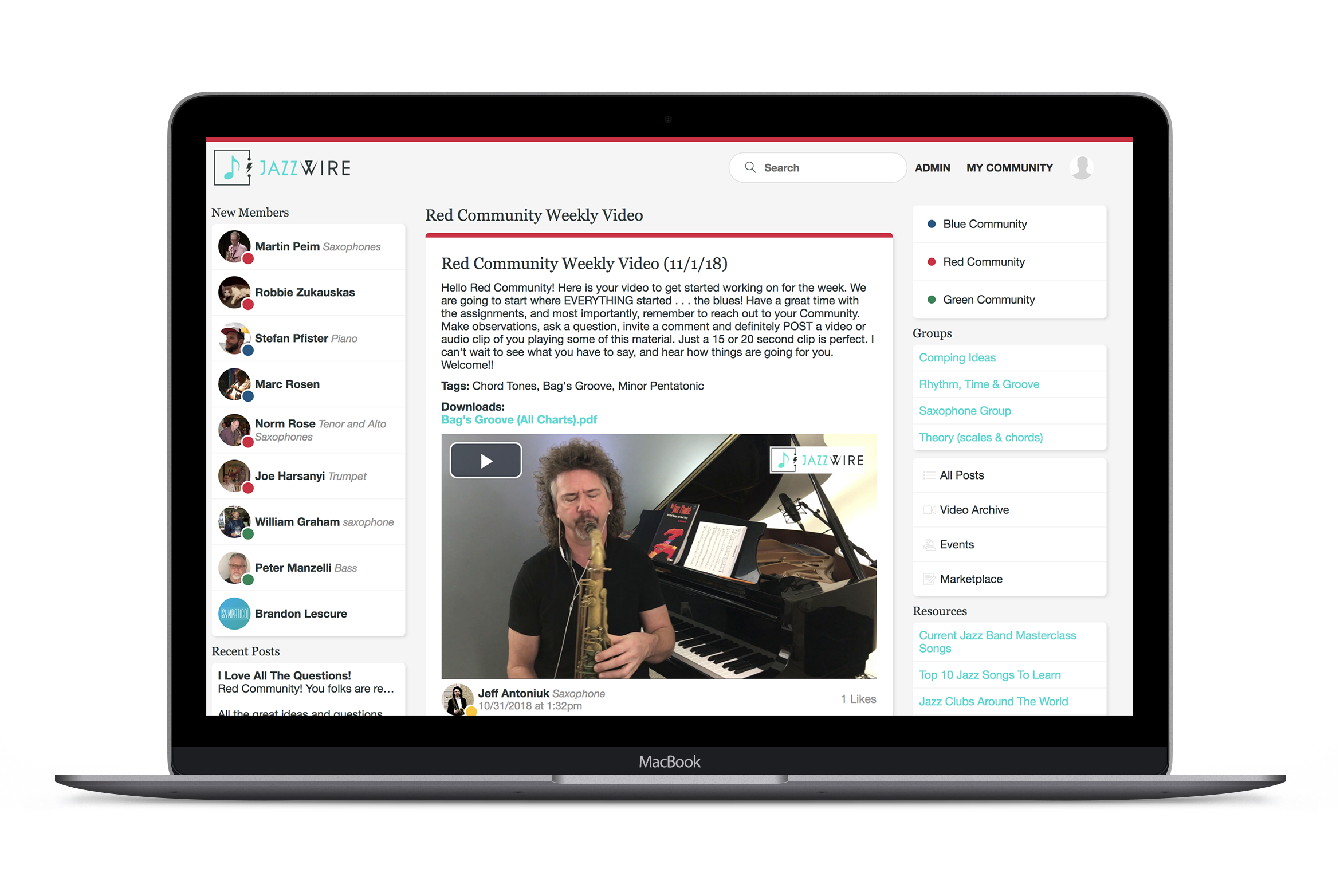The Jazz Wire Community
A great community (or a great jazz band) works best when the members are at the same level, when they have the same shared history, and when they really care about each other. That is when the interactions are deep, meaningful and constructive. At Jazz Wire, your Playing Evaluation and Practice Plan is what lets us know who you are, what you are good at, what you need work on, and who you would have the best experiences working with.
Jeff Antoniuk points all members to the ideal Community for them inside Jazz Wire. This is the place where they will find the experience that so many of us missed by not attending music school – the camaraderie, the support, the competition, the depth. Far from an internet chat room or a Facebook group, the Jazz Wire Communities gain their strength from the fact that the group members have earned their way in. This is not a wide open, come-one, come-all experience. These are powerful, curated communities of engaged and driven musicians. This is where the fun really happens.
What You’ll Be Doing
Wisdom and organized knowledge is what you’ll find at Jazz Wire. To begin with, there are three new video lessons every week, focused at the three different experience levels of the Communities. Song study, theory, comping & rhythm, soloing, rhythm techniques and styles are all just the beginning. You’ll find plenty of great information with us, but you’ll always find specific assignments and stepwise, attainable short term goals. We launched with over 100 archived videos, all searchable by content, style, song, topic and other keywords.
Conversations in the Communities
We’ll be connecting you with other Jazz Wire musicians at your level. We want you to have meaningful, productive and inspiring conversations with passionate jazz musicians all over the world. Wondering what mode works best on the song “Sea Journey?” Where the best jazz club in Paris is? Where there’s a jam session in Oslo or Orlando? The best bass amp under $400? Your friends on Jazz Wire can tell you!

The Three Jazz Wire Communities
Your Community is where you’ll be spending much of your time on Jazz Wire. Jeff will guide you to where he thinks you’ll find the most fruitful conversations and interactions. That said, you can interact in any of the Communities at any time. Take a look around a more advanced Community, or be a mentor in a less advanced group. And, if you get crazy-inspired, you can do all three assignments in each Community every week! Have fun, start some conversations, and get to know your fellow musicians from around the world on Jazz Wire.
Green Community
These are musicians who might be newer to jazz, and/or possibly newer to their instruments as well (or dusting off their instrument after a long break). These folks can function in a jazz group setting, and they continue to grasp more about the roles of their instrument in the band. They are learning more jazz theory, chords, scales, style and feel. Everyone (including John Coltrane and Miles Davis) was at this level, once upon a time! Applying the theory they are learning to the music they are playing is their biggest challenge.
Red Community
These folks consider themselves serious musicians, and play their instruments most days of the week. They are comfortable soloing on a variety of songs and in the different basic jazz styles (swing, bossa, funk/rock). They continue their work on typical jazz progressions (ie. ii-V-I, rhythm changes, etc) and continue learning and using the typical jazz scales and chords. Their best time spent is likely in accumulating more jazz vocabulary.
Blue Community
Blue Community level musicians generally play every day (including some gigs and rehearsals), and likely practice for an hour or two on top of that. These musicians could sit in at a jam session anywhere on earth, playing a song they know, and do just fine. They are digging into expanded thinking on topics like harmony and voicings, rhythmic devices and phrasing, and more “modern” melodic devices. That said, they also understand that there is still plenty of work to be done with the building blocks of jazz style, harmony, rhythm, feel and everything else.